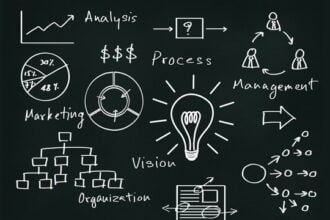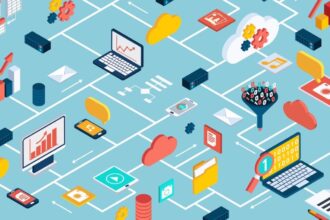Big data may be a big buzzword, but its implications are bombarding the business world, offering new insights to old problems and connecting the dots where previously no dots were even seen. It’s a changing space out there, where what you like on Facebook can tell a marketer your inner-most desires, where the speed of algorithms concerns us more than the speed of light, where monuments and memorials are built to honor the humanity in us all — from a data standpoint.
Big data may be a big buzzword, but its implications are bombarding the business world, offering new insights to old problems and connecting the dots where previously no dots were even seen. It’s a changing space out there, where what you like on Facebook can tell a marketer your inner-most desires, where the speed of algorithms concerns us more than the speed of light, where monuments and memorials are built to honor the humanity in us all — from a data standpoint.
So, yes…big data may indeed be a buzzword, but it’s influence on our business models, our lives and even on the grography of our planet is only beginning. These five Ted Talks get to the heart of the massive shift in perception when it comes to utilizing data, from the security to the oddities and everything in between. It’s time to learn up about the data revolution, and begin to understand your data rights.
1) Jennifer Golbeck: The Curly Fry Conundrum
In this 10 minute talk, Jennifer Golbeck gets to the bottom of social media data — making a case for the truly holistic information each of us shares. For instance, liking “Curly Fries” on Facebook has a high correlation with intelligence, but not because smart people just happen to like curly fries. Instead, based on algorithms and correlations across an individual’s social network, anything can be predicted based on a seemingly unrelated “Like” or “Follow,” including intelligence, religion, political affiliation, sexual orientation and more.
“If users don’t want me to use their data, they should have the right to do that. I want users to be informed and consenting users of the tools we develop.”
Golbeck’s talk makes it obvious that social media identity data has a very high value, and that ensuring users understand that value and have the option to opt-out of supplying that data is key to maintaining privacy in the era of audience intelligence and big data.
2) Alessandro Acquisti: Why Privacy Matters
Big data is being collected all around you and about you whether you want it to be happening or not. In this 15 minute talk, Acquisti questions the line between public and private information, noting that as big data continues to grow, that line blurs. And, in order to secure privacy, something has to be done about it. According to Acquisti, it’s the battle of our time as we fight for our data freedom to choice. It is possible to have the benefits of big data while protecting privacy.
“I believe that one of the defining fights of our time will be the fight over the control of personal information, the fight over whether big data will become a force for freedom or a force which will hiddenly manipulate us.”
Acquisti’s answer lies not just in simply transparency, but in giving users the right to choose, the option to share, the tools and understanding necessary to truly gauge for themselves the implications of sharing their data — and then making the educated decisions to do so, or not.
3) Jer Thorp: Make Data More Human
In a moving 18 minute talk, Thorp presents the value of adding human context to big data, giving large amounts of information true meaning. His example? The 9/11 memorial, on which the names of the victims are not displayed alphabetically, but by adjacency. Brothers next to brothers, co-workers next to co-workers, the 9/11 memorial is the first structure of its kind to utilize big data to affect architecture with a human angle — showcasing the truly myriad connections each of us makes throughout our lives.
“[The 9/11 memorial] has an incredibly timely concept in our era of social networks.”
Big data, he concludes, exists to help us, not harm us. And we should treat it as a tool to do so.
4) Kevin Slavin: Algorithms as Nature
This 15 minute talk begins with a Michael Najjar art piece showcasing Mount Aconcagua as seen from the summit. The steep peaks of the mountain, though, have been altered to accurately portray the Dow Jones stock market over the past 20 to 30 years. In essence, these are data mountains — and Slavin argues that Najjar’s artwork isn’t merely for show, it is a prophecy of how data, particularly algorithms, are changing the very landscape of our world.
“The landscape was always made by this sort of weird, uneasy collaboration between nature and man, but now there is this kind of third co-evolutionary force — the algorithm. And we will have to understand [algorithms] as nature, and in a way, they are.”
As algorithmic speed continues to dictate business outcomes, humans will continue to teraform our planet to make way for speed, precision and ROI at the hands of the algorithm.
5) Philip Evans: How Data Will Transform Business
In 14 minutes, Evans explains the history of traditional business strategy and how it no longer works in today’s modern business world. Instead, data-driven decisions will need to take precedence, not ego.
“Technology is driving the natural scaling of the activity beyond the institutional boundaries in which we have been used to thinking about it.”
Technology is the driving force behind business innovation, and the businesses that begin to a accept and create a culture around using big data will win out in the end.








-330x220.png)